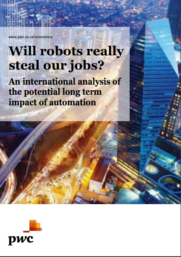
Will robots really steal our jobs?

Artificial intelligence (AI), robotics and other forms of ‘smart automation’ are advancing at a rapid pace and have the potential to bring great benefits to the economy, by boosting productivity and creating new and better products and services. In an earlier study1, we estimated that these technologies could contribute up to 14% to global GDP by 2030, equivalent to around $15 trillion at today’s values.
For advanced economies like the US, the EU and Japan, these technologies could hold the key to reversing the slump in productivity growth seen since the global financial crisis. But they could also produce a lot of disruption, not least to the jobs market. Indeed a recent global PwC survey2 found that 37% of workers were worried about the possibility of losing their jobs due to automation.
To explore this further we have analysed a dataset compiled by the OECD that looks in detail at the tasks involved in the jobs of over 200,000 workers across 29 countries (27 from the OECD plus Singapore and Russia).
- Issue:
- Technological innovation
- Region:
- Global
- Year Published:
- 2016
- Institution:
- PricewaterhouseCoopers (PwC)

